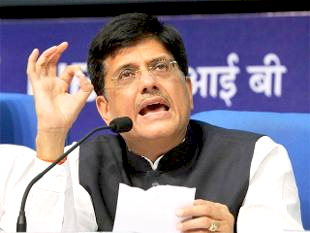New Delhi, Mar 26: The government is working on a scheme to provide electric cars on zero down payment for which people can pay out of their savings on expensive fossil fuels, for becoming 100 per cent electric vehicle nation by 2030.

"We don't need one rupee support from the government. We don't need one rupee investment from the people of India," Power Minister Piyush Goyal said at an event organised by CII Young India here.
Elaborating further, he said, "We are working (on the scheme). Can we actually give electric car for free (zero down payment) and people can pay for that out of the savings on the petroleum products. Innovation is possible, it just needs an open mind. You need to think of scale and be honest."
The minister informed that a small working group under the leadership of Road Minister Nitin Gadkari has been created with Oil Minister Dharmendra Pradhan and Environment Minister Prakash Javadekar on its board.
He said, "We are meeting in first week of April and see (if) India can be 100 per cent on electric vehicles by 2030. We are trying to see if we can monetise the savings then you will have use cheaper electricity for charing of your cars."
"We are thinking of scale. We are thinking of leading the world rather than following the world. India will be first largest country in the world to think of that scale."
Goyal cited the example of LED lights where through the bulk tendering, the government has been able to reduce the procurement price of these bulbs to Rs 64.41 in January this year from the market rate of Rs 310 in February 2014.
The government had started Domestic Efficient Lighting Programme last year under which it has already provided over 8.32 crore LED bulbs to families through power distribution companies at an installment of Rs 10 per month for each bulb.
After the LED bulb distribution scheme, Power Ministry is working on a similar programme under which it will sell on EMI energy-efficient fans and air conditioners at prices much lower than market rates.
About any power tariff he said, "We don't need to increase any tariff in the country. We just need to work smart and bring technology and India can be powerhouse of affordable energy across the country. Cross subsidy across the state can handle the issue."
On the negative subsidy or payment of premium in recently concluded third round of gas auction for stranded power projects (Saps) on Sunday, Goyal said, "There is no need of PSDF now. We have been successful in our mission. Now, they need zero support (subsidy)."
About continuing this scheme further, he said, "We will see after six months. For six months it is not required. After six months there will be another round (of auction for gas under PSDF)." (MORE) KKS STS






Comments
First lets think of basic necessity. Try to make india 100% hunger free nation!!!
Is he a bluff master???
Add new comment